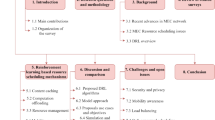Abstract
With the assistance of mobile edge computing (MEC), mobile devices (MDs) can optionally offload local computationally heave tasks to edge servers that are generally deployed at the edge of networks. As thus, the latency of task and energy consumption of MDs can be both reduced, significantly improving mobile users’ quality of experience. Although considerable MEC scheduling algorithms have been designed by researchers, most of them are trained to solve specific tasks, leaving the performance in other MEC environments remaining dubious. To address the issue, this paper first formulates the optimization problem to minimize both task delay and energy consumption, and then transforms it into Markov decision problem that is further solved by using the state-of-the-art multi-agent deep reinforcement learning method, i.e., MADDPG. Furthermore, aiming at improving the overall performance in various MEC environments, we integrate MADDPG with meta-learning and propose Meta-MADDPG which is carefully designed with dedicated reward functions. The evaluation results are given to showcase the more satisfactory performances of Meta-MADDPG over the state-of-the-art algorithms when confronting new environments.
Access this chapter
Tax calculation will be finalised at checkout
Purchases are for personal use only
Similar content being viewed by others
References
Sabella, D., Vaillant, A., Kuure, P., Rauschenbach, U., Giust, F.: Mobile edge computing architecture: the role of MEC in the internet of things. IEEE Consum. Electr. Mag. 5(4), 84–91 (2016)
Mach, P., Becvar, Z.: Mobile edge computing: a survey on architecture and computation offloading. IEEE Commun. Surv. Tutorials 19(3), 1628–1656 (2017)
Arulkumaran, K., Deisenroth, M.P., Brundage, M., Bharath, A.A.: Deep reinforcement learning: a brief survey. IEEE Signal Process. Mag. 34(6), 26–38 (2017)
Li, J., Gao, H., Lv, T., Lu, Y.: Deep reinforcement learning based computation offloading and resource allocation for MEC. In: Proceedings of the 2018 IEEE Wireless Communications and Networking Conference (2018)
Wang, Y., Ru, Z., Wang, K., Huang, P.: Joint deployment and task scheduling optimization for large-scale mobile users in multi-UAV-enabled mobile edge computing. IEEE Trans. Cybern. 50(9), 3984–3997 (2020)
Peng, H., Shen, X.: Multi-agent reinforcement learning based resource management in MEC- and UAV-assisted vehicular networks. IEEE J. Sel. Areas Commun. 39(1), 131–141 (2021)
Vilalta, R., Drissi, Y.: A perspective view and survey of meta-learning. Artif. Intell. Rev. 18, 77–95 (2002)
R. Lowe, Y. Wu, A. Tamar, J Harb, OpenAI Pieter Abbeel, Igor Mordatch: Multi-Agent Actor-Critic for Mixed Cooperative-Competitive Environments. Advances in Neural Information Processing Systems 30 (NIPS 2017)
Duan, Y., Schulman, J., Chen, X., et al.: RL ^ 2: Fast reinforcement learning via slow reinforcement learning. arXiv preprint arXiv:1611.02779 (2016)
Wang, C., Yu, F.R., Liang, C., Chen, Q., Tang, L.: Joint computation offloading and interference management in wireless cellular networks with mobile edge computing. IEEE Trans. Veh. Technol. 66(8), 7432–7445 (2017)
Wen, Y., Zhang, W., Luo, H.: Energy-optimal mobile application execution: taming resource-poor mobile devices with cloud clones. In: Proceedings of the 2012 IEEE INFOCOM (2012)
Zhou, P., Finley, B., Li, X., Tarkoma, S., Kangasharju, J., Ammar, M., Hui, P.: 5G MEC computation handoff for mobile augmented reality. Computer Science Networking and Internet Architecture (2021)
Hochba, D.S.: Approximation algorithms for NP-hard problems. ACM SIGACT News 28(2), 40–52 (1997)
Kaelbling, L.P., Littman, M.L., Moore, A.W.: Reinforcement learning: a survey. J. Artif. Intell. Res. 4, 237–285 (1996)
Cao, Y., Jiang, T., Wang, C.: Optimal radio resource allocation for mobile task offloading in cellular networks. IEEE Network 28(5), 68–73 (2014)
Author information
Authors and Affiliations
Corresponding author
Editor information
Editors and Affiliations
Rights and permissions
Copyright information
© 2022 The Author(s), under exclusive license to Springer Nature Switzerland AG
About this paper
Cite this paper
Yao, Y., Ren, T., Cui, M., Liu, D., Niu, J. (2022). Meta-MADDPG: Achieving Transfer-Enhanced MEC Scheduling via Meta Reinforcement Learning. In: Wang, L., Segal, M., Chen, J., Qiu, T. (eds) Wireless Algorithms, Systems, and Applications. WASA 2022. Lecture Notes in Computer Science, vol 13473. Springer, Cham. https://doi.org/10.1007/978-3-031-19211-1_47
Download citation
DOI: https://doi.org/10.1007/978-3-031-19211-1_47
Published:
Publisher Name: Springer, Cham
Print ISBN: 978-3-031-19210-4
Online ISBN: 978-3-031-19211-1
eBook Packages: Computer ScienceComputer Science (R0)




